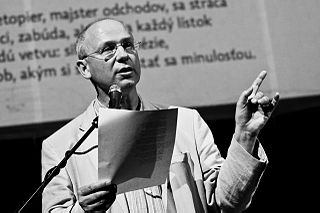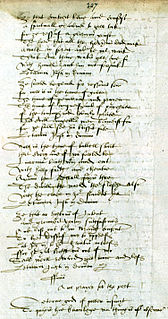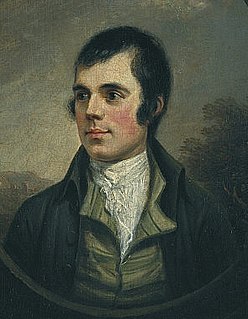Related Research Articles

Dame Carol Ann Duffy is a British poet and playwright. She is a professor of contemporary poetry at Manchester Metropolitan University, and was appointed Poet Laureate in May 2009, resigning in 2019. She is the first woman, the first Scottish-born poet and the first known LGBT poet to hold the position.

Scottish literature is literature written in Scotland or by Scottish writers. It includes works in English, Scottish Gaelic, Scots, Brythonic, French, Latin, Norn or other languages written within the modern boundaries of Scotland.

Edwin George Morgan was a Scottish poet and translator associated with the Scottish Renaissance. He is widely recognised as one of the foremost Scottish poets of the 20th century. In 1999, Morgan was made the first Glasgow Poet Laureate. In 2004, he was named as the first Scottish national poet: The Scots Makar.

A makar is a term from Scottish literature for a poet or bard, often thought of as a royal court poet.
Liz Lochhead HonFRSE is a Scottish poet, playwright, translator and broadcaster. Between 2011 and 2016 she was the Makar, or National Poet of Scotland, and served as Poet Laureate for Glasgow between 2005 and 2011.
Helen Burness Cruickshank was a Scottish poet and suffragette and a focal point of the Scottish Renaissance. Scottish writers associated with the movement met at her home in Corstorphine.

Jacqueline Margaret Kay,, is a Scottish poet, playwright, and novelist, known for her works Other Lovers (1993), Trumpet (1998) and Red Dust Road (2011). Kay has won a number of awards, including the Guardian Fiction Prize in 1998 and the Scottish Mortgage Investment Trust Book of the Year Award in 2011.
William Neill was an Ayrshire-born poet who wrote in Scottish and Irish Gaelic, Scots and English. He was a major contributing voice to the Scottish Renaissance.
Stewart Conn is a Scottish poet and playwright, born in Hillhead, Glasgow. His father was a minister at Kelvinside Church but the family moved to Kilmarnock, Ayrshire in 1941 when he was five. During the 1960s and 1970s, he worked for the BBC at their offices off Queen Margaret Drive and moved to Edinburgh in 1977, where until 1992 he was based as BBC Scotland's head of radio drama. He was Edinburgh’s first makar or poet laureate in 2002-05.

Jenni Calder is a Scottish literary historian, and arts establishment figure.

W. N. Herbert, also known as Bill Herbert is a poet from Dundee, Scotland. He writes in both English and Scots. He and Richard Price founded the poetry magazine Gairfish. He currently teaches at Newcastle University.
Roderick Watson is a Scottish poet. He is a professor emeritus in English Studies at the University of Stirling.

Christine De Luca is a Scottish poet and writer from Shetland, who writes in both English and Shetland dialect Her poetry has been translated into many languages. She was appointed Edinburgh's Makar, or poet laureate from 2014 to 2017. De Luca is a global advocate for the Shetland dialect and literature of the Northern Isles of Scotland.
Dilys Rose is a Scottish fiction writer and poet. Born in 1954 in Glasgow, Rose studied at Edinburgh University, where she taught Creative Writing from 2002 until 2017. She was Director of the MSc in Creative Writing by Online Learning from 2012-2017. She is currently a Royal Literary Fellow at the University of Glasgow. Her third novel Unspeakable was published by Freight Books in 2017.
Alan Spence is a Scottish writer and is Professor in Creative Writing at the University of Aberdeen, where he is also artistic director of the annual WORD Festival. He was born in Glasgow, educated at Allan Glen's School there, and much of his work is set in the city.

Scottish literature in the Middle Ages is literature written in Scotland, or by Scottish writers, between the departure of the Romans from Britain in the fifth century, until the establishment of the Renaissance in the late fifteenth century and early sixteenth century. It includes literature written in Brythonic, Scottish Gaelic, Scots, French and Latin.

Poetry of Scotland includes all forms of verse written in Brythonic, Latin, Scottish Gaelic, Scots, French, English and Esperanto and any language in which poetry has been written within the boundaries of modern Scotland, or by Scottish people.

Scots-language literature is literature, including poetry, prose and drama, written in the Scots language in its many forms and derivatives. Middle Scots became the dominant language of Scotland in the late Middle Ages. The first surviving major text in Scots literature is John Barbour's Brus (1375). Some ballads may date back to the thirteenth century, but were not recorded until the eighteenth century. In the early fifteenth century Scots historical works included Andrew of Wyntoun's verse Orygynale Cronykil of Scotland and Blind Harry's The Wallace. Much Middle Scots literature was produced by makars, poets with links to the royal court, which included James I, who wrote the extended poem The Kingis Quair. Writers such as William Dunbar, Robert Henryson, Walter Kennedy and Gavin Douglas have been seen as creating a golden age in Scottish poetry. In the late fifteenth century, Scots prose also began to develop as a genre. The first complete surviving work is John Ireland's The Meroure of Wyssdome (1490). There were also prose translations of French books of chivalry that survive from the 1450s. The landmark work in the reign of James IV was Gavin Douglas's version of Virgil's Aeneid.
Morelle Smith is a Scottish author of poetry, essays, fiction, and travel articles who currently lives in Edinburgh, Scotland.
Gillian K. Ferguson is a Scottish poet and journalist, born and living in Edinburgh, Scotland. She is the creator of Air for Sleeping Fish (Bloodaxe) and the best-seller, Baby: Poems on Pregnancy, Birth and Babies. She won a £25,000 Creative Scotland Award and created a major poetry project exploring the human genome called The Human Genome: Poems on the Book of Life, About her project, she said, "the Genome has remained fascinating throughout; a fantastic, beautiful poem - a magnificent work of Chemistry spanning four billion years of the art of Evolution." The project was praised, including by broadcaster, Andrew Marr of the BBC, Francis Collins, Head of the US Human Genome Project and by philosopher Mary Midgley author of Science and Poetry (Routledge).
References
- 1 2 3 "Valerie Gillies | Poetry". Scottish Poetry Library. Retrieved 2018-02-23.
- 1 2 "New Writer is Chosen". The Lothian Times. 11 January 1992.
- ↑ "Valerie Gillies - Literature". literature.britishcouncil.org. Retrieved 2018-02-23.
- ↑ "Calling aspiring writers and poets". The University of Edinburgh Bulletin. 6 December 1995.
- 1 2 "Writer Profile: Valerie Gillies". The Eildon Tree (8). Autumn 2002.
- ↑ "Valerie Gillies Poetry". ValerieGillies.com. Retrieved 2018-02-23.
- ↑ "Valerie is District's Writer-in-Residence". The Advertiser. 2 January 1992.
- ↑ "The Spring Teller". Scottish PEN. Retrieved 2018-02-23.
- ↑ "Valerie Gillies". The Royal Literary Fund. Retrieved 2018-02-23.